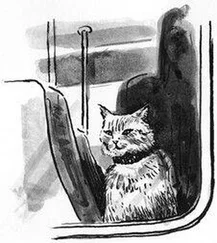The deputy started to ask, “Was he doing it when...”
“That's right,” said Bensenhaver. He put his hand into a horrible mess by the accelerator pedal, but he didn't seem to mind. He was reaching for the knife on the floor of the passenger's side. He picked it up in his handkerchief; he looked it over carefully, wrapped it in the handkerchief, and put it in his pocket.
“Look,” the deputy whispered, conspiratorially. “Did you ever hear of a rapist wearing a rubber?”
“It's not common,” Bensenhaver said. “But it's not unknown.”
“It's weird to me,” said the deputy. He looked amazed as Bensenhaver pinched the prophylactic tight, just below its bulge; Bensenhaver snapped the rubber off and held it, without spilling a drop, up to the light. The sack was as large as a tennis ball, it hadn't leaked. It was full of blood.
Bensenhaver looked satisfied; he tied a knot in the condom, the way you'd knot a balloon, and he flung it so far into the bean field that it was out of sight.
“I don't want someone suggesting that it might not have been a rape,” Bensenhayer said softly to the deputy. “Got it?”
He didn't wait for the deputy to answer; Bensenhaver went to the back of the truck to be with Mrs. Standish.
“How old was he—that boy?” Hope asked Bensenhaver.
“Old enough,” Bensenhaver told her. “About twenty-five or twenty-six,” he added. He did not want anything to diminish her survival—particularly, in her own eyes. He waved to the pilot, who was to help Mrs. Standish aboard. Then he went to clear things with the deputy. “You stay here with the body and the bad driver,” he told him.
“I'm not a bad driver,” the driver whined. “Christ, if you'd seen that lady there-in the road...”
“And keep anyone away from the truck,” Bensenhaver said.
On the road was the shirt belonging to Mrs. Standish's husband; Bensenhaver picked it up and trotted to the helicopter in his funny, overweight way of running. The two men watched Bensenhaver climb aboard the helicopter and rise away from them. The weak spring sun seemed to leave with the copter and they were suddenly cold and didn't know where to go. Not in the truck, certainly, and sitting in the driver's car meant crossing that field of muck. They went to the pickup, lowered the tailgate, and sat on it.
“Will he call a tow truck for my car?” the driver asked.
“He'll probably forget,” the deputy said. He was thinking about Bensenhaver; he admired him, but he feared him, and he also thought that Bensenhaver was not to be totally trusted. There were questions of orthodoxy, if that's what it was, which the deputy had never considered. Mainly, the deputy just had too many things to think about at one time.
The driver paced back and forth in the pickup, which irritated the deputy because it jounced him on the tailgate. The driver avoided the foul, bunched blanket crammed in the corner next to the cab; he cleared a see-through spot on the dusted and caked rear window so that he could, occasionally, squint inside the cab at the rigid and disemboweled body of Oren Rath. All the blood was dry now, and through the mottled rear window the body looked to the driver to be similar, in color and in gloss, to an eggplant. He went and sat down on the tailgate beside the deputy, who got up, walked back in the truck, and peered in the window at the gashed corpse.
“You know what?” the driver said. “Even though she was all messed up, you could tell what a really good-looking woman she was.”
“Yes, you could,” the deputy agreed. The driver now paced around in the back of the truck with him, so the deputy went to the tailgate and sat down.
“Don't get sore,” the driver said.
“I'm not sore,” the deputy said.
“I don't mean that I can sympathize with anyone who'd want to rape her, you know,” the driver said.
“I know what you don't mean,” said the deputy.
The deputy knew he was over his head in these matters, but the simple-mindedness of the driver forced the deputy to adopt what he imagined was Bensenhayer's attitude of contempt for him .
“You see a lot of this, huh?” the driver asked. “You know: rape and murder.”
“Enough,” the deputy said with self-conscious solemnity. He had never seen a rape or murder before, and he realized that even now he had not actually seen it through his own eyes as much as he'd been treated to the experience through the eyes of Arden Bensenhaver. He had seen rape and murder according to Bensenhaver, he thought. The deputy felt very confused; he sought some point of view all his own.
“Well", said the driver, peering in the rear window again, “I seen some stuff in the service, but nothing like this.”
The deputy couldn't respond.
The World According to Bensenhaver
“This is like war, I guess,” the driver said. “This is like a bad hospital.”
The deputy wondered if he should let the fool look at Rath's body, if it mattered or not, and to whom? Certainly it couldn't matter to Rath. But to his unreal family? To the deputy?— he didn't know. And would Bensenhaver object?
“Hey, don't mind my asking you a personal question,” the driver said. “Don't get sore, okay?”
“Okay,” said the deputy.
“Well,” the driver said. “What happened to the rubber?”
“ What rubber?” asked the deputy; he might have had some questions concerning Bensenhaver's sanity, but the deputy had no doubt that, in this case, Bensenhaver had been right. In the world according to Bensenhaver, no trivial detail should make less of rape's outrage.
Hope Standish, at that moment, felt safe at last in Bensenhaver's world. She floated and dipped over the farmlands beside him, trying not to be sick. She was beginning to notice things about her body again—she could smell herself and feel every sore spot. She felt such disgust, but here was this cheerful policeman who sat there admiring her—his heart touched by her violent success.
“Are you married, Mr. Bensenhaver?” she asked him.
“Yes, Mrs. Standish,” he said. “I am.”
“You've been awfully nice,” Hope told him, “but I think I'm going to be sick now.”
“Oh, sure,” said Bensenhaver; he grabbed a waxy paper bag at his feet. It was the pilot's lunch bag; there were some uneaten french-fried potatoes at the bottom and the grease had turned the waxed paper translucent. Bensenhaver could see his own hand, through the french fries and through the bottom of the bag. “Here,” he said. “You go right ahead.”
She was already retching; she took the bag from him and turned her head away. The bag did not feel big enough to contain what vileness she was sure she held inside her. She felt Bensenhaver's hard, heavy hand on her back. With his other hand, he held a strand of her matted hair out of her way. “That's right,” he encouraged her, “keep it coming, get it all out and you'll feel much better.”
Hope recalled that whenever Nicky was being sick, she told him the same thing. She marveled how Bensenhaver could even turn her vomiting into a victory, but she did feel much better—the rhythmic heaving was as soothing to her as his calm, dry hands, holding her head and patting her back. When the bag ripped and spilled, Bensenhaver said, “Good riddance, Mrs. Standish! You don't need the bag. This is a National Guard helicopter. We'll let the National Guard clean it up! After all—what's the National Guard for ?”
The pilot flew on, grimly, his expression never changing.
“What a day it's been for you, Mrs. Standish!” Bensenhaver went on. “Your husband is going to be so proud of you.” But Bensenhaver was thinking that he'd better make sure; he'd better have a talk with the man. It was Arden Bensenhaver's experience that husbands and other people did not always take a rape in the right way.
Читать дальше












